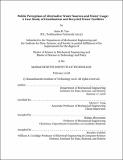| dc.contributor.advisor | Maria C. Yang. | en_US |
| dc.contributor.author | Yun, Janet H | en_US |
| dc.contributor.other | Technology and Policy Program. | en_US |
| dc.date.accessioned | 2018-05-23T15:03:37Z | |
| dc.date.available | 2018-05-23T15:03:37Z | |
| dc.date.copyright | 2018 | en_US |
| dc.date.issued | 2018-05-23 | |
| dc.identifier.uri | http://hdl.handle.net/1721.1/115589 | |
| dc.description | Thesis: S.M., Massachusetts Institute of Technology, Department of Mechanical Engineering, 2018. | en_US |
| dc.description | Thesis: S.M. in Technology and Policy Massachusetts Institute of Technology, School of Engineering, Institute for Data, Systems, and Society, Technology and Policy Program, 2018. | en_US |
| dc.description | This electronic version was submitted by the student author. The certified thesis is available in the Institute Archives and Special Collections. | en_US |
| dc.description | Cataloged from student-submitted PDF version of thesis. | en_US |
| dc.description | Includes bibliographical references (pages 78-80). | en_US |
| dc.description.abstract | The importance of public acceptance within the decision-making process for large-scale, municipal water projects is widely understood and documented. In order to assess the role of public perception on the acceptance of alternative water sources, this paper broadly evaluates public preference for alternative water source and water conservation programs through a user-based approach. Choice-based conjoint analysis was utilized as a quantitative method to determine which design attributes make alternative water sources, specifically desalination and recycled water facilities, more appealing to communities. An online survey was taken by 306 respondents in California, Florida, and Texas. Respondents were analyzed on an aggregate level to identify overall perception of, familiarity with, and preference for desalinated and recycled water. The results indicate significant importance placed on specific attributes such as cost and environmental impact, as opposed to the water program type and location of the proposed facility. Findings based on subpopulations of respondents suggest that preference between water program types were fairly consistent among different demographics, but varied on characteristics such as increased familiarity and perceived reliability of currently provided tap water. | en_US |
| dc.description.statementofresponsibility | by Janet H. Yun. | en_US |
| dc.format.extent | 80 pages | en_US |
| dc.language.iso | eng | en_US |
| dc.publisher | Massachusetts Institute of Technology | en_US |
| dc.rights | MIT theses are protected by copyright. They may be viewed, downloaded, or printed from this source but further reproduction or distribution in any format is prohibited without written permission. | en_US |
| dc.rights.uri | http://dspace.mit.edu/handle/1721.1/7582 | en_US |
| dc.subject | Mechanical Engineering. | en_US |
| dc.subject | Institute for Data, Systems, and Society. | en_US |
| dc.subject | Technology and Policy Program. | en_US |
| dc.title | Public perception of alternative water sources and water usage : a case study of desalination and recycled Water facilities | en_US |
| dc.title.alternative | Case study of desalination and recycled Water facilities | en_US |
| dc.type | Thesis | en_US |
| dc.description.degree | S.M. | en_US |
| dc.description.degree | S.M. in Technology and Policy | en_US |
| dc.contributor.department | Massachusetts Institute of Technology. Department of Mechanical Engineering | |
| dc.identifier.oclc | 1036985300 | en_US |
